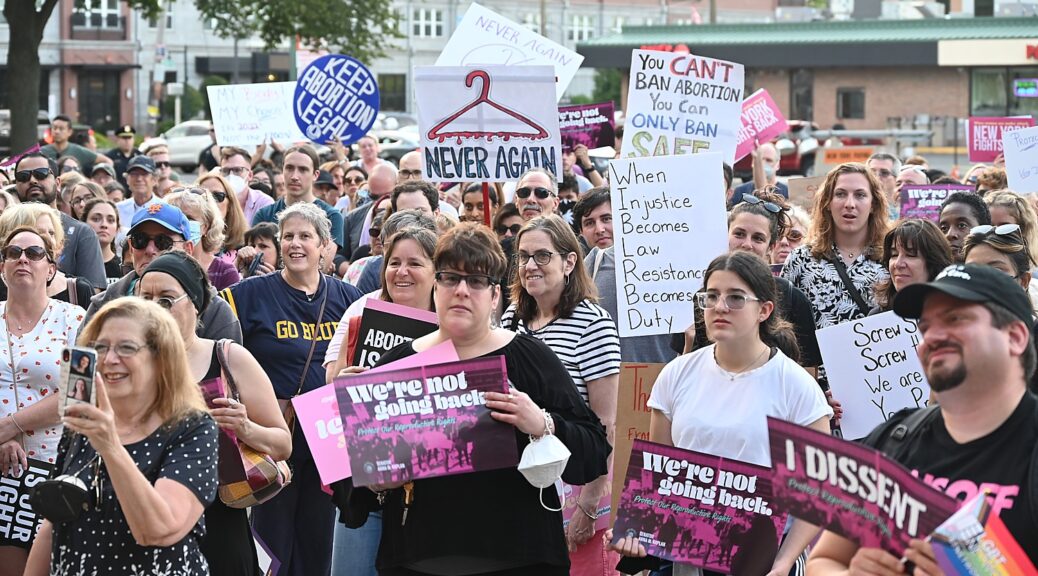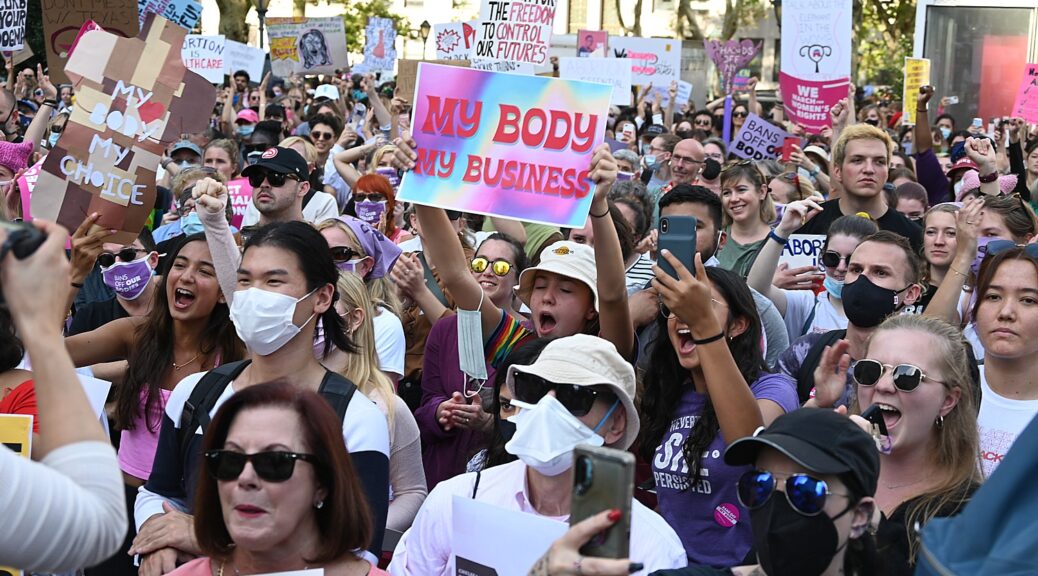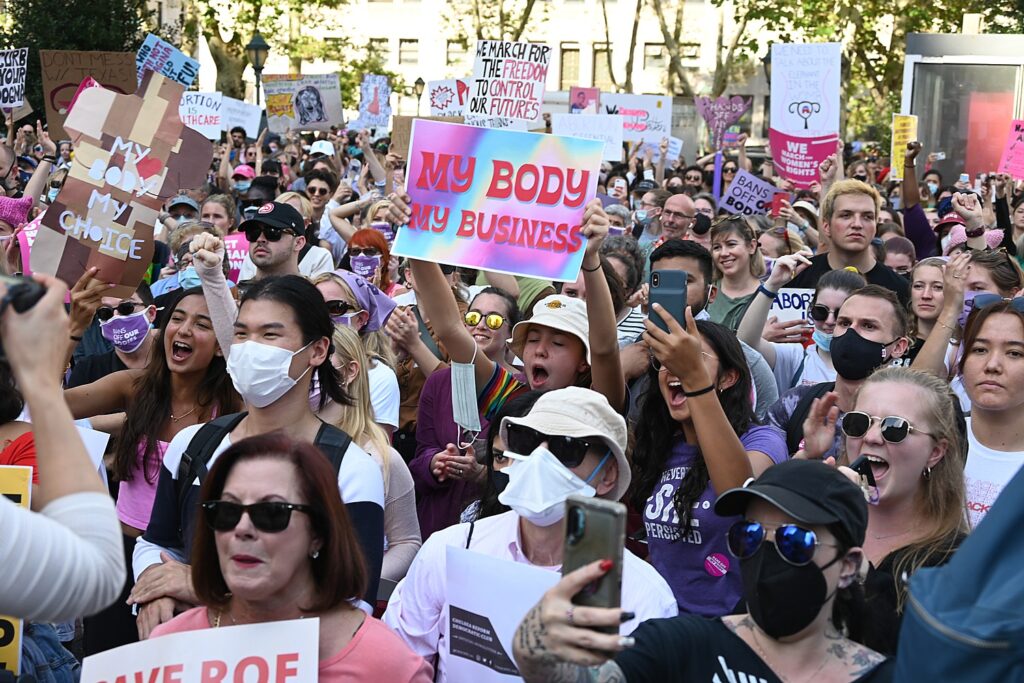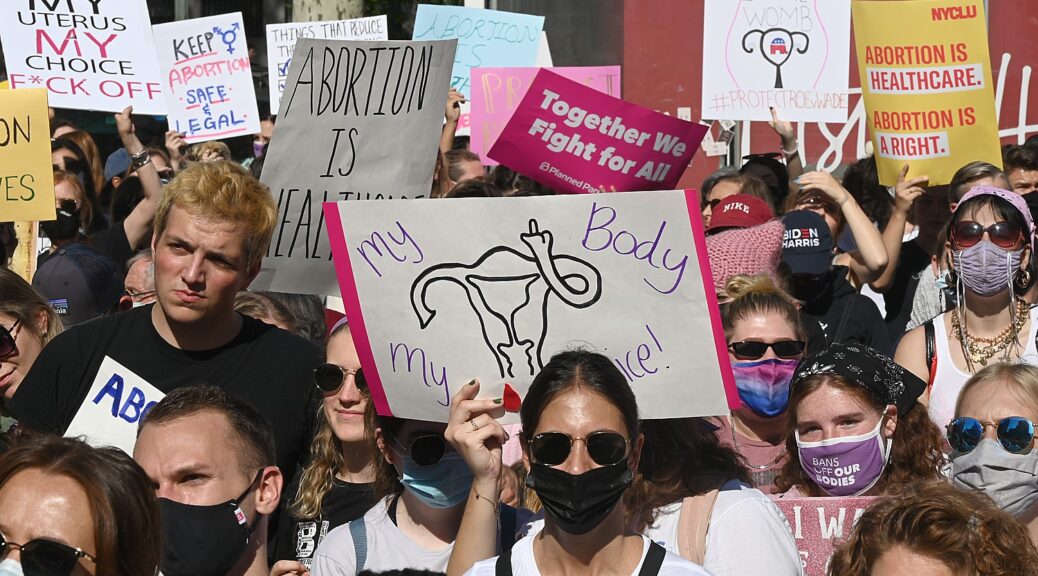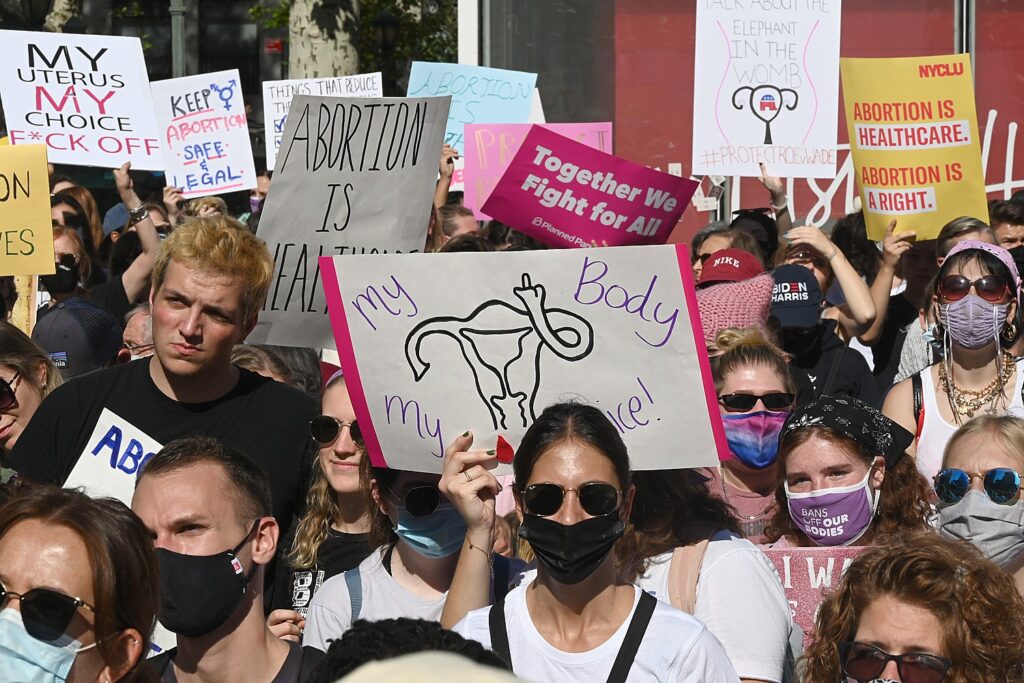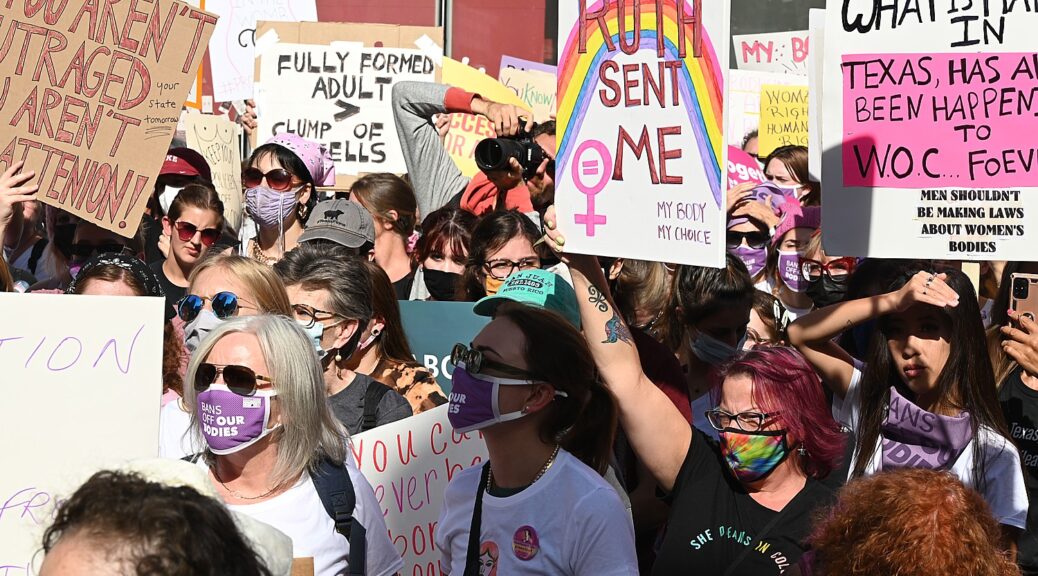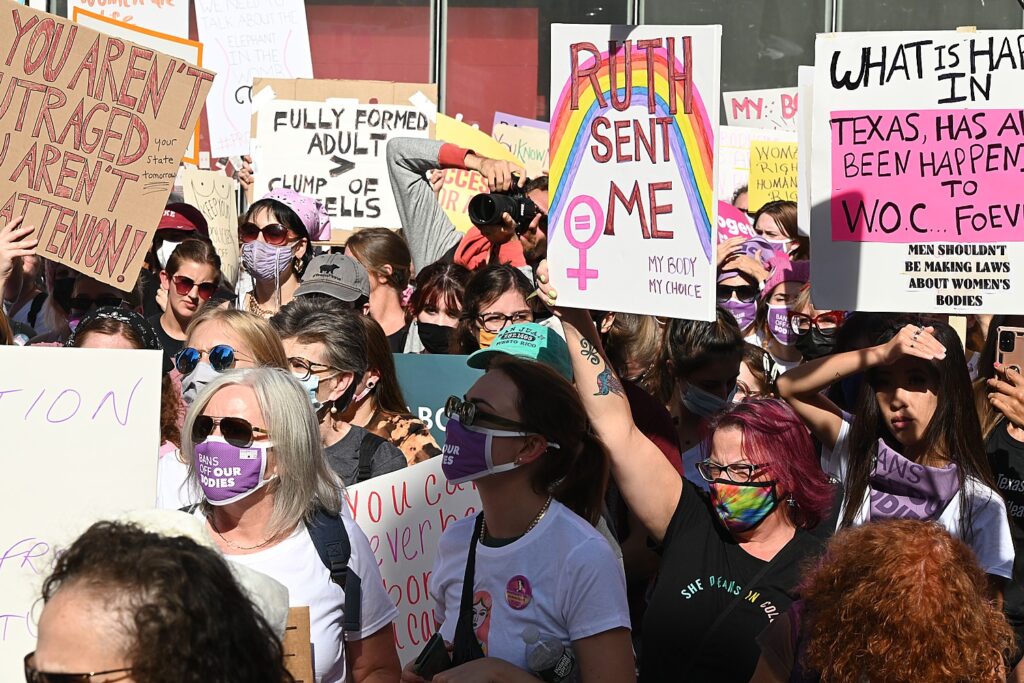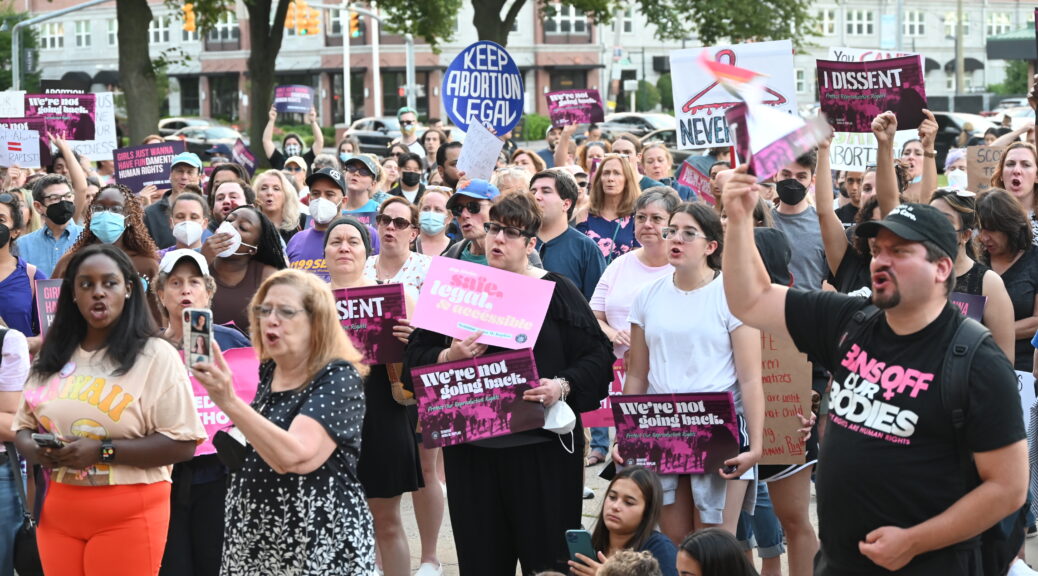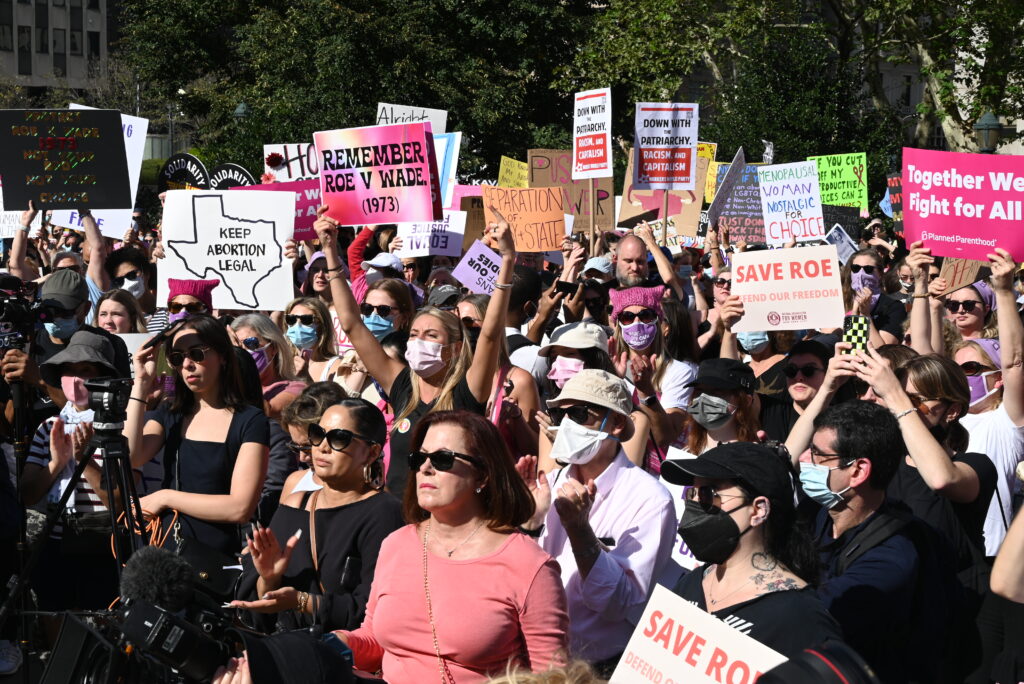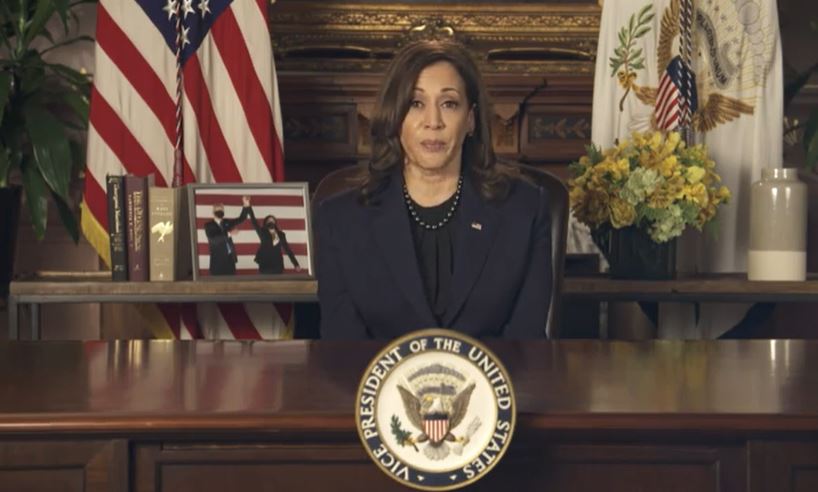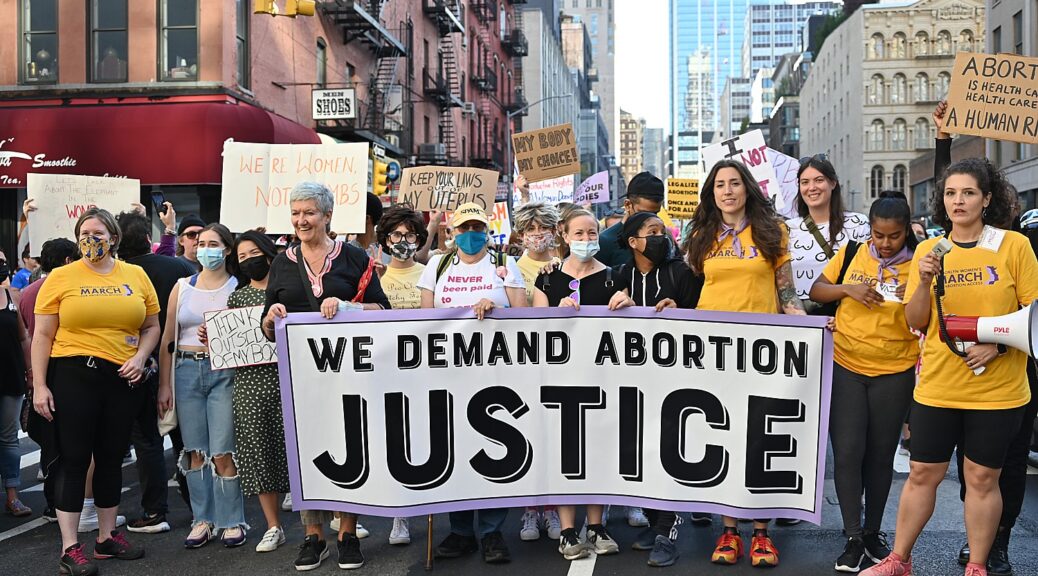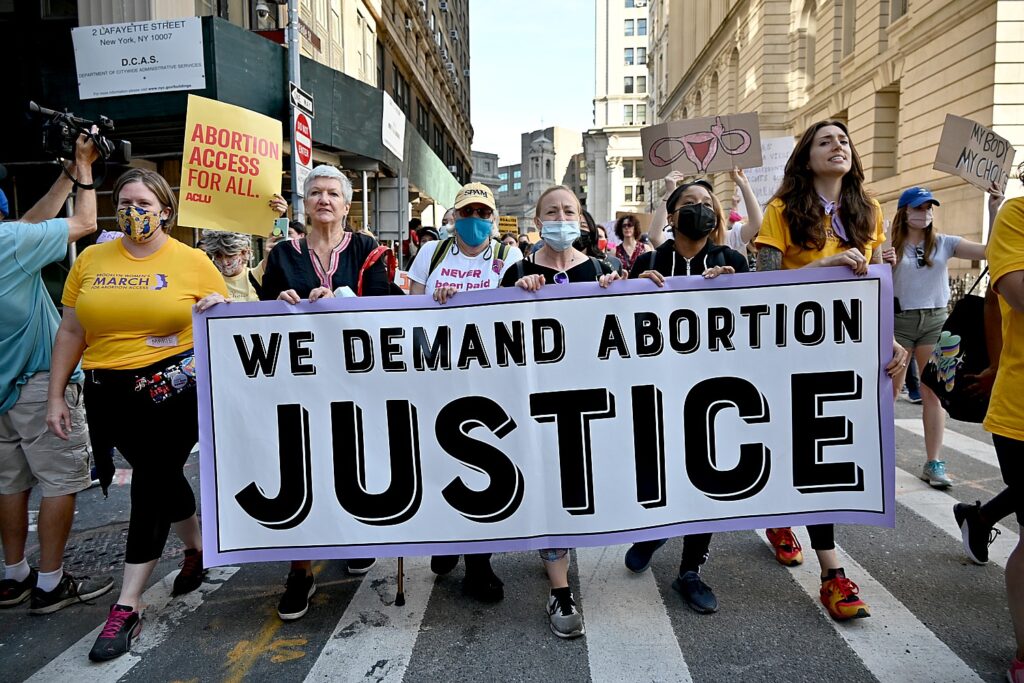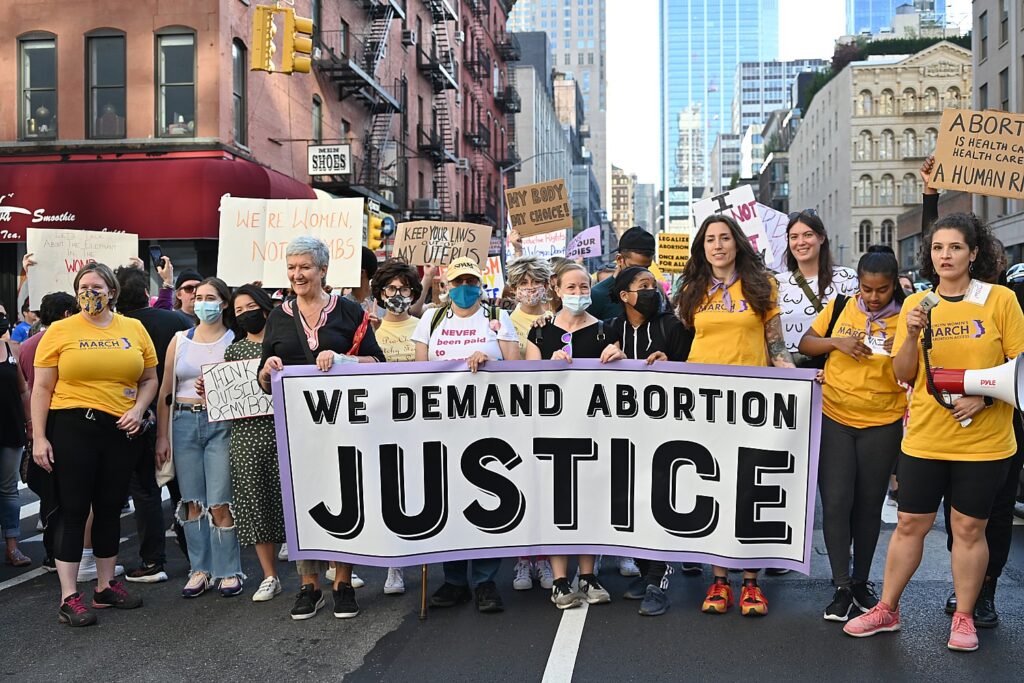
The White House provided this fact sheet updating efforts by the Biden-Harris Administration to protect women’s reproductive freedom in the face of the ongoing assault from states and courts dominated by the religious right. The devastating impacts on the lives of women and families has been clear – most recently in Alabama’s use of “personhood” to elevate the “rights” of a frozen embryo over the mother and inject government control over her life and future. And Biden’s forceful whole-of-government approach is in contrast to the presumed Republican nominee, Trump’s, promise of instituting a national abortion ban of 15 or 16 weeks, Trump is not sure yet which number sounds better, and prosecuting women who try to assert their reproductive freedom.—Karen Rubin, [email protected]
Nearly two years after the Supreme Court overturned Roe v. Wade and the constitutional right to choose, millions of Americans are living under extreme state abortion bans. These dangerous laws are putting women’s health and lives at risk and threatening doctors with jail time, including life in prison, for providing the health care they have been trained to provide. And Republicans’ extreme out-of-touch agenda has put access to fertility treatments at risk for families who are desperately trying to get pregnant.
Tonight, Kate Cox and Latorya Beasley will join the First Lady as her guests at the State of the Union. Kate, a mother of two from Texas, has experienced the devastating consequences of state abortion bans and courageously spoke out about her experience seeking the care she needed to preserve her health—becoming one of the first women in 50 years to have to turn to the courts to ask permission to receive the abortion that her doctor recommended. She, like too many other women across the country, was ultimately forced to travel out of state for care that she would have been able to receive if Roe v. Wade were still the law of the land.
After a ruling from the Alabama Supreme Court put access to in vitro fertilization (IVF) on pause in much of the state, Latorya and her husband, who had been preparing for another round of IVF, learned that their embryo transfer was abruptly canceled. This heartbreaking setback in her and her husband’s journey to have their second child through IVF is yet another example of how the overturning of Roe v. Wade has disrupted access to reproductive health care for women and families across the country.
President Biden and Vice President Harris believe that stories like Kate’s and Latorya’s should never happen in America. But Republican elected officials want to impose this reality on women nationwide. They are doubling down on their assault on fundamental freedoms by proposing ever-more extreme bans in states and three national abortion bans in Congress. And, just last week, Senate Republicans blocked a vote to safeguard nationwide access to IVF. Their ongoing disregard for women’s ability to make these decisions for themselves and their families is outrageous and unacceptable.
In his State of the Union Address, President Biden will again call on Congress to restore the protections of Roe v. Wade in federal law so women in every state have the freedom to make deeply personal health care decisions. And the Biden-Harris Administration will continue to take executive action to protect access to reproductive health care, including through ongoing implementation of the President’s three Executive Orders and a Presidential Memorandum issued since the Court overturned Roe v. Wade. To date, the Administration has taken action to:
- Protect access to abortion, including FDA-approved medication abortion;
- Defend access to emergency medical care;
- Support the ability to travel for reproductive health care;
- Strengthen access to high-quality, affordable contraception;
- Safeguard the privacy of patients and health care providers; and
- Ensure access to accurate information and legal resources.
Protect Access to Abortion, Including FDA-Approved Medication Abortion
The Administration will continue fighting to protect a woman’s ability to access abortion care, including by defending access to FDA-approved, safe and effective medication abortion. The Administration will continue to:
- Protect Access to Safe and Legal Medication Abortion. On what would have been the 50th anniversary of Roe v. Wade, President Biden issued a Presidential Memorandum directing agencies to consider further efforts to support patients, providers, and pharmacies who wish to legally access, prescribe, or provide medication abortion. This Presidential Memorandum followed independent, evidence-based action taken by the Food and Drug Administration (FDA) to allow mifepristone to be prescribed by telehealth and sent by mail as well as to enable interested pharmacies to become certified to dispense the medication. As a result of the new pathway established by FDA, many pharmacies across the country—including major retail pharmacy chains—are now certified to dispense medication abortion. This new option gives many women the option to pick up their prescription for medication abortion at a local, certified pharmacy just as they would for any other medication.
- Defend FDA Approval of Medication Abortion in Court. FDA and the Department of Justice (DOJ) are defending access to mifepristone—a safe and effective drug used in medication abortion that FDA first approved more than twenty years ago—and FDA’s independent, expert judgment in court, including in a lawsuit before the Supreme Court that attempts to curtail access nationwide. The Administration will continue to stand by FDA’s decades-old approval and regulation of the medication as well as FDA’s ability to review, approve, and regulate a wide range of prescription medications. Efforts to impose outdated restrictions on mifepristone would limit access to this critical medication in every state in the country.
- Partner with State Leaders on the Frontlines of Abortion Access. The White House continues to partner with leaders on the frontlines of protecting access to abortion—both those fighting extreme state legislation and those advancing proactive policies to protect access to reproductive health care, including for patients who are forced to travel out of state for care. The Vice President has led these efforts, traveling to 20 states and meeting with more than 250 state legislators, health care providers, and advocates in the past year. And, on what would have been the 51st anniversary of Roe, the Vice President launched her nationwide Fight for Reproductive Freedoms tour to continue fighting back against extreme attacks throughout America.
- Provide Access to Reproductive Health Care for Veterans. The Department of Veterans Affairs (VA) issued a final rule to allow VA to provide abortion counseling and, in certain circumstances, abortion care to veterans and VA beneficiaries. Under this rule, VA provides abortion services when the health or life of the patient would be endangered if the pregnancy were carried to term or when the pregnancy is a result of rape or incest. When working within the scope of their federal employment, VA employees may provide abortion services as authorized by federal law regardless of state restrictions.
- Support Access to Care for Service Members. The Department of Defense (DoD) has taken action to ensure that Service members and their families can access reproductive health care and that DoD health care providers can operate effectively. DoD released policies to support Service members and their families’ ability to travel for lawful reproductive health care, including abortion care and assisted reproductive technology services, and to bolster Service members’ privacy and afford them the time and space needed to make personal health care decisions.
Defend Access to Emergency Medical Care
All patients, including women experiencing pregnancy loss and other pregnancy-related emergencies, must be able to access the emergency medical care required by federal law. The Administration will continue to:
- Defend Access to Emergency Abortion Care. Republican elected officials have put women’s lives at risk by banning abortion even when a doctor determines that an abortion is necessary to prevent serious health consequences. The Administration is committed to ensuring that women who are experiencing pregnancy loss and other pregnancy-related emergencies have access to the full rights and protections for emergency medical care afforded under the Emergency Medical Treatment and Labor Act (EMTALA)—including abortion care when that is the stabilizing treatment required. The Department of Health and Human Services (HHS) issued guidance and Secretary Becerra sent letters to providers affirming the Administration’s view that EMTALA preempts conflicting state law restricting access to abortion in emergency situations. The DOJ has taken action defend and enforce that interpretation before the Supreme Court, which is expected to rule by June.
- Educate Patients and Health Care Providers on Their Rights and Obligations for Emergency Medical Care. To increase awareness of EMTALA and improve the procedures for ensuring that patients facing all types of medical emergencies receive the care to which they are entitled, HHS issued a comprehensive plan to educate all patients about their rights and to help ensure hospitals meet their obligations under federal law. This effort included the launch of new accessible and understandable resources about rights and protections for patients under EMTALA and the process for submitting a complaint. HHS will also disseminate training materials for health care providers and establish a dedicated team of experts who will increase the Department’s capacity to support hospitals and providers across the country in complying with federal requirements—to help ensure that every patient receives the emergency medical care required under federal law.
Support the Ability to Travel for Reproductive Health Care
Women must be able to cross state lines to access legal reproductive health care. In the face of threats to the constitutional right to travel, the Administration will continue to:
- Defend the Right to Travel. On the day the Supreme Court overturned Roe v. Wade, President Biden reaffirmed the Attorney General’s statement that women must remain free to travel safely to another state to seek the care they need. In November 2023, DOJ filed a statement of interest in two lawsuits challenging the Alabama Attorney General’s threat to prosecute people who provide assistance to women seeking lawful out-of-state abortions. DOJ explained that the threatened Alabama prosecutions infringe the constitutional right to travel and made clear that states may not punish third parties for assisting women in exercising that right. DOJ continues to monitor states’ efforts to restrict the constitutional right to travel across state lines to receive lawful health care.
- Support Patients Traveling Out of State for Medical Care. HHS issued a letter to U.S. governors inviting them to apply for Section 1115 waivers to expand access to care under the Medicaid program for women traveling from a state where reproductive rights are under attack and women may be denied medical care. HHS continues to review pending waiver applications and encourage state leaders to develop new waiver proposals that would support access to reproductive health care services.
Strengthen Access to High-Quality, Affordable Contraception
Contraception is an essential component of reproductive health care and has only become more important in the wake of the overturning of Roe v. Wade. In addition to FDA’s approval of the first daily oral contraceptive for over-the-counter use, the Administration will continue to:
- Strengthen Access to Affordable, High-Quality Contraception. Ahead of the one-year anniversary of the Supreme Court’s decision to overturn Roe v. Wade, the President issued an Executive Order directing agencies to consider actions to improve access and affordability for women with private health insurance; bolster access across Federal health programs; promote access to over-the-counter contraception; and further support access for Service members, veterans, Federal employees, and college students. Recent actions taken to implement this Executive Order include:
- The Departments of the Treasury, Labor, and HHS issued new guidance to clarify standards and support expanded coverage of a broader range of FDA-approved contraceptives at no cost under the Affordable Care Act. This action builds on guidance issued in July 2022 to clarify protections for contraceptive coverage under the Affordable Care Act.
- The Office of Personnel Management strengthened access to contraception for federal workers, retirees, and family members by issuing guidance to insurers participating in the Federal Employee Health Benefits Program that incorporates the Departments’ guidance. OPM has also newly required insurers that participate in the Federal Employee Health Benefits Program to take additional steps to educate enrollees about their contraception benefits.
- The Secretary of HHS issued a letter to private health insurers, state Medicaid programs and state Children’s Health Insurance Programs, and Medicare plans about their obligations to cover contraception for those they serve. The letter targets a wide range of payers to advance compliance with existing standards and underscore the Administration’s commitment to ensuring that women across the country can access affordable contraception.
- The Departments of the Treasury, Labor, and HHS issued a Request for Information to solicit public input on how to best ensure coverage and access to over-the-counter preventive services, including contraception, at no cost and without a prescription from a health care provider.
- Vice President Harris and the Department of Education convened representatives from 68 college and university leaders in 32 states to hear promising strategies from leaders of postsecondary institutions for protecting and expanding access to contraception for their students and on campus.
- The Gender Policy Council, Domestic Policy Council, and leaders from the Departments of the Treasury, Labor, and HHS called on private sector leaders to take robust additional actions to further expand access to contraception.
- The Gender Policy Council and the Department of Health and Human Services joined a convening focused on strategies to expand the role of pharmacies and pharmacists in promoting access to contraception and breaking down barriers for consumers.
- Expand Access to More Women Under the Affordable Care Act. The Departments of the Treasury, Labor, and HHS proposed a rule to help ensure that all women with private health coverage who need and want contraception can obtain it without cost sharing as guaranteed under the Affordable Care Act. Millions of women have already benefited from this coverage, which has helped them save billions of dollars on contraception.
- Support Access to Family Planning Services Through Title X Clinics. HHS has strengthened access to care through Title X clinics, which have played a critical role in ensuring access to a broad range of high-quality family planning and preventive health services for more than 50 years. HHS provided funds to help these safety net clinics deliver equitable, affordable, client-centered, and high-quality family planning services and provide training and technical assistance for Title X clinics. Last year, HHS provided $263 million to over 4,000 Title X clinics across the country to provide a wide range of voluntary, client-centered family planning and related preventive services. The Title X Family Planning Program remains a critical part of the nation’s safety net, providing free or low-cost services for 2.6 million clients in 2022.
- Promote Access to Contraception for Service Members and Their Families and Certain Dependents of Veterans. To improve access to contraception at military hospitals and clinics, DoD expanded walk-in contraceptive care services for active-duty Service members and other Military Health System beneficiaries, and eliminated TRICARE copays for certain contraceptive services. And VA proposed a rule to eliminate out-of-pocket costs for certain types of contraception through the Civilian Health and Medical Program of the Department of Veterans Affairs.
Safeguard the Privacy of Patients and Health Care Providers
The Administration is committed to safeguarding sensitive health information and strengthening privacy protections for women and health care providers. The Administration will continue to:
- Strengthen Reproductive Health Privacy under HIPAA. HHS issued a proposed rule to strengthen privacy protections under the Health Insurance Portability and Accountability Act (HIPAA). As proposed, this rule would prevent an individual’s information from being disclosed to investigate, sue, or prosecute an individual, a health care provider, or a loved one simply because that person sought, obtained, provided, or facilitated legal reproductive health care, including abortion. By safeguarding sensitive information related to reproductive health care, the rule will strengthen patient-provider confidentiality and help health care providers give complete and accurate information to patients. Prior to the proposed rule, HHS issued guidance reaffirming HIPAA’s existing protections for the privacy of individuals’ protected health information.
- Take Action Against Illegal Use and Sharing of Sensitive Health Information. The Federal Trade Commission (FTC) has committed to enforcing the law against illegal use and sharing of highly sensitive data, including information related to reproductive health care. Consistent with this commitment, the FTC has taken several enforcement actions against companies for disclosing consumers’ personal health information, including highly sensitive reproductive health data, without permission.
- Help Consumers Protect Their Personal Data. The Federal Communications Commission (FCC) launched a guide for consumers on best practices for protecting their personal data, including geolocation data, on mobile phones. The guide follows a proposed rule that would strengthen data breach rules to provide greater protections to personal data. Separately, HHS issued a how-to guide for consumers on steps they can take to better protect their data on personal cell phones or tablets and when using mobile health apps, like period trackers, which are generally not protected by HIPAA.
- Protect Students’ Health Information. The Department of Education (ED) issued guidance to over 20,000 school officials to remind them of their obligations to protect student privacy under the Family Educational Rights and Privacy Act. The guidance helps ensure that school officials—at federally funded school districts, colleges, and universities—know that, with certain exceptions, they must obtain written consent from eligible students or parents before disclosing personally identifiable information from students’ educational records, which may include student health information. The guidance encourages school officials to consider the importance of student privacy, including health privacy, with respect to disclosing student records. ED also issued a know-your-rights resource to help students understand their privacy rights for health records at school.
- Safeguard Patients’ Electronic Health Information. HHS issued guidance and a final rule affirming that doctors and other medical providers can take steps to protect patients’ electronic health information, including their information related to reproductive health care. HHS makes clear that patients have the right to ask that their electronic health information generally not be disclosed by a physician, hospital, or other health care provider. The guidance also reminds health care providers that HIPAA’s privacy protections apply to patients’ electronic health information.
Ensure Access to Accurate Information and Legal Resources
The Supreme Court’s decision to overturn Roe v. Wade has led to chaos and confusion. To help ensure that Americans have access to accurate information about their rights, the Administration will continue to:
- Ensure Easy Access to Reliable Information. HHS launched and maintains ReproductiveRights.gov, which provides timely and accurate information on people’s right to access reproductive health care, including contraception, abortion services, and health insurance coverage, as well as how to file a patient privacy or nondiscrimination complaint. DOJ also launched justice.gov/reproductive-rights, a webpage that provides a centralized online resource on the Department’s ongoing work to protect access to reproductive health care services under federal law.
Hosted a Convening of Lawyers in Defense of Reproductive Rights. DOJ and the Office of White House Counsel convened more than 200 lawyers and advocates from private firms, bar associations, legal aid organizations, reproductive rights groups, and law schools across the country for a convening of pro-bono attorneys, as directed in the first Executive Order. Following this convening, reproductive rights organizations launched the Abortion Defense Network to offer abortion-related legal defense services, including legal advice and representation.

